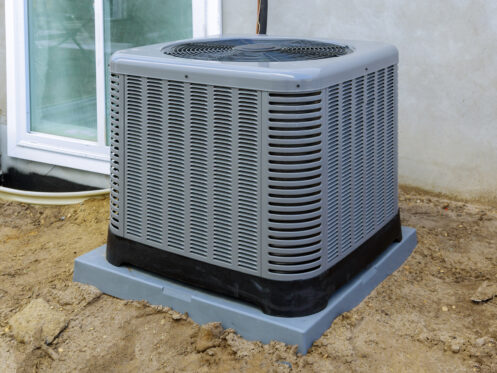HVAC warranties are vital and can help when performing routine maintenance or if your system is damaged. While many people disregard warranties, they are necessary due to the significant investment in your climate control system. Here is information about the types of warranties available, what is often covered, and what is not covered by various warranties.
Types of HVAC Warranties
There are different types of warranties offered to the HVAC owner. Many serve as a guarantee for repairs or total replacement of HVAC parts or appliances by the contractor or manufacturer within a given time. Some only cover parts, while others also cover labor. Although the type of warranty depends on the manufacturer or individual contractor, two major types of warranties are available: limited and extended warranties.
Limited Warranties
Think of the limited warranty as your HVAC seatbelt. It’s included to safeguard against manufacturing defects that make your system unusable through no fault of yours or the contractor. Coverage usually lasts five to 10 years and focus on protecting internal mechanical or electrical components.
But limited warranties only cover so much. Normal wear and tear, issues that arise from improper installation, weather events, and other external factors fall outside this scope. In many instances, repairs are done by a contractor at a cost.
Extended Warranties
Extended warranties are policies that can be purchased alongside the basic limited warranty and usually go beyond the warranty period. They often come with more comprehensive terms. These warranties are typically offered for a cost by HVAC contractors. The specific coverage may vary depending on the provider. It generally extends the time for repairs or replacements of covered components while safeguarding against external factors.
What Is Typically Covered?
HVAC contractors aim to warrant the core functioning components that keep your HVAC system running safely and efficiently. Frequently covered items include compressors, indoor and outdoor coils, heat exchangers, circuit boards, blowers, fan motors, thermostats, and accessories such as filters, fuses, and capacitors.
While coverage may vary between warranties, protecting key functional parts is generally the focus. Be sure to carefully review your specific warranty documents to understand all terms and conditions.
Common Issues Not Covered
While warranties address defects that prevent your HVAC system from working as intended, some issues fall outside coverage, such as ductwork leaks, cracks, and disconnected runs. Faults due to improper maintenance, like failing to change the filter or schedule professional maintenance, may lead to a voided warranty. Some manufacturers require that you get regular maintenance from an approved company.
While manufacturers warrant the core system components, regular checkups, filter replacements, and other routine care by Atticman Heating and Air Conditioning, Insulation in Sacramento will ensure the HVAC system in your home works perfectly.
Maximizing Warranty Coverage
To get the full benefit of your HVAC warranty, be sure to follow these steps.
Keep Documentation
HVAC manufacturers require documentation to prove the purchase date and service history. Keeping these documents protects your eligibility should any covered repairs be needed within the warranty period. Electronic records are also acceptable in many cases.
Follow a Maintenance Schedule
Getting annual or seasonal tune-ups is critical to extending the life of your equipment and warranty. HVAC contractors, such as Atticman Heating and Air Conditioning, Insulation in Sacramento, can catch minor issues before they become expensive failures. Sticking to the maintenance schedule is written into most warranties as a requirement for coverage.
Use Approved Parts
Many manufacturers require that any replacement parts are genuine HVAC components made or approved by the manufacturer. At Atticman Heating and Air Conditioning, Insulation, we stick to this because it helps your system run as intended and protects your warranty.
Hire Licensed Pros
Only qualified HVAC technicians can perform repairs covered under warranty. Unlicensed work risks invalidating your protection plan. HVAC contractors such as Atticman Heating and Air Conditioning, Insulation ensure issues are addressed according to the manufacturer’s standards.
Report Issues Promptly
It is always important to seek help before multiple minor problems compound into a major failure. Warranty coverage can be denied if the HVAC contractor determines that the delay led to further damage. Contact support as soon as you notice any performance reduction or odd noises.
Read Fine Print
Thoroughly review your warranty documents to understand coverage periods, filing deadlines, repair vs replacement terms, and exclusions. Don’t risk missing out on benefits due to overlooking essential details in the small print.
Extending HVAC Warranty Coverage
While standard warranty lengths provide protection, you may want greater peace of mind for the lifespan of your HVAC system. Extending warranty coverage can offer that added assurance. Consider the overall costs of repairing covered components when weighing extended warranty options. Protection from hefty repair bills is worth a nominal extended warranty fee for your peace of mind.
Standard Warranty Claims and Resolution Process
Even with the best care, components can eventually fail due to typical wear and tear or defects. Here are some common warranty claims homeowners make and the typical resolution process.
Failed Compressor
If your compressor fails, the HVAC contractor must review it as per the warranty. However, the repairs or replacement of the compressors is always conditional as per the warranty guidelines.
Inoperative Blower Motor
A service technician from the contractor will test the motor and determine the root cause of the problem. The motor’s warranty information and service records are submitted to the contractor for review.
Cracked Heat Exchanger
The contractor will inspect the heat exchanger to check for cracks and determine the cause. If the cause was a lack of maintenance, including not properly changing the filter, you may be fully responsible for the bill.
Non-Functioning Thermostat
If the thermostat stops working, it will undergo testing to determine the root cause. A legitimate failure while under warranty results in a thermostat replacement.
Circuit Board Replacement
When testing reveals a faulty circuit board, it will be replaced if it is a covered part. Our technicians will also install a new circuit board to ensure all components receive the correct signals to work correctly for you as per the warrant or at the owner’s cost.
Rely on Us for Warranty Repairs
In each case, an approved HVAC company such as Atticman Heating and Air Conditioning, Insulation must inspect the system, confirm that the issue qualifies under the warranty coverage, and perform any repairs or replacements. Homeowners are rarely responsible for costs associated with warranted items as long as maintenance records are in order. Communication is crucial in getting claims resolved smoothly.
Although HVAC warranties offer valuable protection, understanding coverage limits prevents frustration later. Working with reputable installers such as Atticman Heating and Air Conditioning, Insulation makes claims go smoother. With our NATE-certified technicians, we provide installation, repair, and maintenance services for all residential and light commercial HVAC systems. We back our work with industry-leading warranties such as lifetime heat exchanger coverage and five-year extended labor protection.
Don’t risk voided warranties from lack of maintenance. At Atticman Heating and Air Conditioning, Insulation in Sacramento, CA, we are your champions for premier heating, cooling, indoor air quality, and duct sealing solutions. Our excellent protection will offer you peace of mind. Contact us today to schedule a service, get a free quote, or learn how we can keep your family comfortable all year round.


